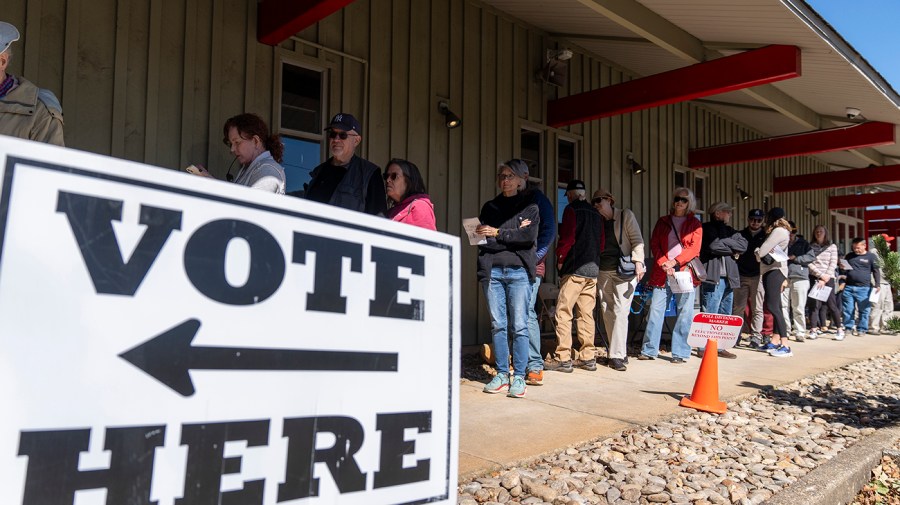
Does it make a difference if people vote by mail or wait until Election Day? Of course it does.
Votes cast by mail are in the bank. The votes of those intending to vote are provisional — subject to the vagaries of having to get to the polls. And so Democrats, by embracing the early vote, have been getting a hidden advantage not revealed by the polls.
Since 2010, Democrats have been slightly more likely to vote by mail than Republicans, in both midterm and presidential elections. There was a 4-point gap in the 2012 presidential election and a 5-point gap in 2016. But in 2020, that advantage increased substantially: mail-in votes from Democrats were nearly twice those of Republicans, with 60 percent of Democrats reporting a mail-in vote compared to 32 percent of Republicans. And although the gap was not nearly as wide as in 2022, Democrats maintained a significant edge, with 46 percent voting by mail compared to 27 percent of Republicans doing the same.
Voting via mail or with an absentee ballot has also become more popular in the last few elections, increasing steadily from 1996 to 2020. Twenty-one percent of voters mailed in their vote in 2016, and 43 percent did so in 2020. In the 2022 midterm election, 32 percent of voters — still 11 points more than 2016 — mailed in their vote, suggesting some stickiness of the pandemic’s effect on voting behavior. Forty-five percent of voters say they will vote early this year.
The direct impact of mail-in votes on the election outcome — worth up to 2 points for Democrats in the past — boils down to some simple math.
Let’s say a race is 50-50, with a total of 100 voters. Assuming each half will vote for their respective party candidate, let’s say 40 voters will vote by mail and 60 will vote in-person. That’s 20 votes for the Democratic candidate and 20 votes for the Republican candidate. Early mail-in votes are a done deal, but those planning to vote on Election Day could get sidelined by chance mishaps — poor weather, a busy workday, a sudden illness in the family. Assuming a 10 percent drop-off rate, the remaining 30-30 split becomes 27-27. The election is tied at 47-47.
Now suppose two-thirds of the 40 mail-in votes are Democrats, as was the case in 2020. The split in mail-in votes becomes 27 for the Democratic candidate and 13 for the Republican candidate. Since we started at 50-50, we now have 23 Democratic voters and 37 Republican voters left. With the same 10 percent drop off, Democrats get 21 votes on Election Day and Republicans get 33. The final result is 48-46 — Democrats win.
The differential is even worse at a 15 or 20 percent drop-off rate. It wasn’t fraud that killed the Republicans — it was math.
But now it looks like the playing field has evened out: coming into this November, the gap has narrowed to just 2 points nationally, with 38 percent of Democrats and 36 percent of Republicans voting early. More than 78 million people have already voted. Nearly 67 million Americans requested mail ballots so far, and more than 35 million have been returned, including roughly 49 and 55 percent from Democratic and Republican voters, respectively.
The Republican catch-up is likely the result of numerous GOP “get out the vote” efforts, including VotePro — a free toolkit that includes information on requesting and returning a ballot — and canvassers, digital advertising, phone calls and targeted text messages urging supporters of Donald Trump to vote early, especially in battleground states. Trump himself told supporters on former Fox News host Dan Bongino’s podcast to vote early. The push seems to have worked: Both North Carolina and Georgia set turnout records on the first day of early voting this year.
As of Nov. 4, Trump leads Vice President Harris by 0.8 points in the seven key battleground states. But early voting in Pennsylvania is the one exception, with 56 percent identifying as Democrats and 33 percent as Republicans. The 23-point advantage is significant for Democrats, though it is a lot lower than the nearly 50-point gap four years ago. The narrowing is yet another positive sign for Republicans looking to get their voters to polls early — roughly 35 percent of Republicans who have cast an early vote in Pennsylvania are voters who had cast ballots day-of in 2020.
But Trump is lagging in early voting among Pennsylvania voters over the age of 65 — a once-reliable Republican constituency. Senior voters have cast nearly half of the early ballots in the state, with about 58 percent of votes from registered Democrats and 35 percent from Republicans, even though both parties account for roughly equal numbers of registered senior voters. The senior vote is crucial not only in Pennsylvania but in five of the seven battleground states, with more residents over the age of 65 than the national average.
Pennsylvania is key for both candidates. If Trump takes Georgia, North Carolina and Pennsylvania, he wins even if Kamala Harris takes Wisconsin and Michigan. If he nabs Arizona, he can even lose Georgia or North Carolina and still win with Nevada. But if Harris gets the three blue wall states — Pennsylvania, Michigan and Wisconsin — she’ll get exactly 270 electoral votes.
Donald Trump’s edge in battleground states is razor-thin, as the horse race remains within the margin of error of any poll. Republicans seem to have figured out the math on mail-in voting, and that could be worth the 2 points they need to win this election — the one hiccup being whether they have produced enough early votes in Pennsylvania, where they still trail significantly.
Mark Penn is chairman of the Harris Poll and CEO of Stagwell, Inc. He served as a pollster and adviser to Bill and Hillary Clinton from 1995 to 2008.














